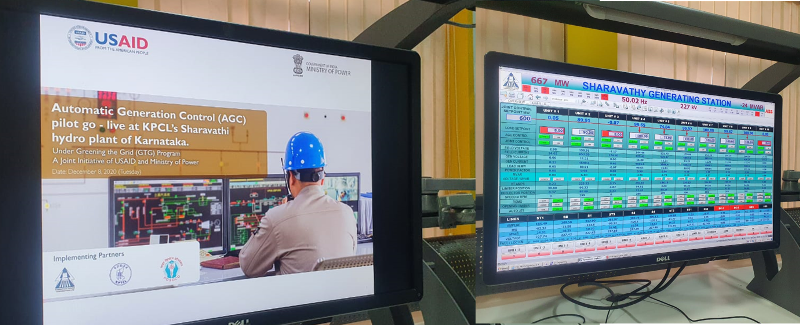Gearing up for change: Automatic generation control (AGC) pilot goes live at Karnataka’s Hydro Plant
India’s clean energy objectives demand high renewable energy (RE) penetration, toward which the country has set impressive targets. Large-scale integration of RE into the energy mix requires a proactive, evidence-based approach to handle the threat to stability and reliability of electric grid that integration of variable RE will pose. This is an imperative that the Ministry of Power, Government of India, is seeking to address with the support of its partner USAID under the Greening the Grid-Renewable Integration and Sustainable Energy (GTG-RISE) initiative and is implemented by Deloitte Consulting. One of GTG-RISE’s several innovative pilots is aimed at supporting the adoption of automatic generation control (AGC) for hydro and solar power plants in Southern India. AGC will enable grid operators to easily adjust the power output of generators in response to changes in load. India’s Central Electricity Regulatory Commission (CERC) has outlined a roadmap for AGC adoption in the country to enable secondary control of ancillary services to balance the supply and demand for energy in real-time.
A high-profile virtual event on December 8 marked the go-live launch of GTG-RISE’s AGC pilot in a state-owned hydro plant of Karnataka. The closed-door event was organized under the GTG-RISE initiative in partnership with Karnataka Power Corporation Ltd (KPCL), Karnataka Power Transmission Corporation Ltd (KPTCL), and Power System Operation Corporation (POSOSO). Senior government officials took part in the proceedings, including Mritunjay Kumar Narayan, Joint Secretary (Transmission), Ministry of Power; Julia Kennedy, Indo Pacific Office Director (A), K.V.S. Baba, Chairman & Managing Director (MD), POSOCO; V. Ponnuraj, MD, KPCL and Dr R. Nagaraja, MD, Power Research Development Consultants Pvt Ltd (PRDC). Representatives from KPCL, KPTCL, State Load Despatch Centre (SLDC), and system integrators (ABB India Limited) were also in attendance.
There was consensus among the attending the event highlighted the critical role of the AGC pilot to support India’s RE goals. Expressing his support for the pilot, Mritunjay Kumar Narayan, Joint Secretary (Transmission), Ministry of Power, stated: “This is indeed an epochal moment for us. The AGC pilot at KPCL’s hydro plant will showcase pathways to implement AGC and will give us critical data to inform rollout at national level. I thank USAID for their partnership in taking forward these important pilots under its GTG-RISE initiative.” The enthusiasm and conviction resonated in the words of K.V.S. Baba, Chairman and MD, POSOCO: “The AGC pilot is a dream come true for all system operators. Integration of renewables is going to become more complex, and Karnataka is leading from the front by demonstrating the use of AGC in its hydro power plant. I congratulate everyone associated with this pilot.”
The addresses and remarks by representatives of key stakeholders were followed by a test run demonstration of the AGC pilot at the Sharavathi hydro plant in Karnataka. The team of system integrators and SLDC led the test run, demonstrating the Sharavathi generators smoothly increasing or decreasing generation in response to AGC signal commands by SLDC.
The AGC pilot is among the initiatives that the governments of the U.S. and India are collaborating on for deployment and integration of RE and new technologies into the grid in an effort to modernize India’s power systems. This commitment was reiterated at the event by senior USAID functionaries and Government of India representatives. “Renewable energy deployment in South Asia is essential to enhance energy security and lower the carbon footprint, which is a key mandate of the U.S. government’s Asia Enhancing Development and Growth through Energy initiative, or Asia EDGE initiative. This pilot will help realize this goal by enabling large-scale RE deployment,” said Julia Kennedy, Deputy Indo-Pacific Coordinator, USAID/India who delivered the welcome remarks.


